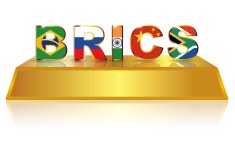- On June 13, Vietnam became the tenth partner country of BRICS, marking a significant step in the bloc’s expansion and reflecting the growing influence of the Global South.
- The decision was made during a BRICS foreign ministers’ meeting and underscores a strategic realignment in global economic and political dynamics, with BRICS now accounting for about 40 percent of global GDP in terms of purchasing power parity.
- Vietnam’s accession grants it access to key economic initiatives and aligns it with a group advocating for a more inclusive international order. With a population of nearly 100 million and a dynamic economy, Vietnam is a relevant actor in Asia.
- Vietnam and BRICS members are committed to fostering a more equitable global order. Vietnam aims to contribute to enhancing the voice of developing countries and promoting international solidarity and inclusive multilateralism.
- Vietnam’s entry into BRICS highlights the bloc’s ambition to reshape global governance structures and amplify the voices of the Global South. This partnership could set a precedent for future collaborations and redefine international cooperation.
On Saturday, June 14, Brazil’s foreign ministry announced that Vietnam had become the tenth partner country of BRICS on June 13, a significant development in the bloc’s ongoing expansion. This move underscores the growing influence of the Global South and reflects a strategic realignment in global economic and political dynamics.
The decision was made during a meeting of BRICS foreign ministers.
Vietnam’s accession to BRICS comes at a time when the bloc is actively seeking to broaden its global footprint. Established in 2009 by Brazil, Russia, India and China, with South Africa joining in 2010, BRICS has since expanded to include Egypt, the United Arab Emirates, Ethiopia, Indonesia and Iran. The bloc now accounts for approximately 40 percent of global GDP in terms of purchasing power parity, surpassing the combined economic weight of the G7, according to Russian Foreign Minister Sergey Lavrov. (Related: Indonesia joins BRICS in a growing challenge to Western dominance.)
Vietnam’s inclusion as a BRICS partner country grants it access to key economic initiatives and aligns it with a group that advocates for a more inclusive and representative international order.
“With a population of almost 100 million and a dynamic economy deeply integrated into global value chains, Vietnam stands out as a relevant actor in Asia,” Brazil’s Ministry of Foreign Affairs stated.
The ministry emphasized that Vietnam shares the BRICS members’ commitment to fostering a more equitable global order. This sentiment was echoed by Russian President Vladimir Putin, who praised the group for its “dictate-free” cooperation and expressed Moscow’s intention to continue building an effective system of equal and mutually beneficial international cooperation.
China, a founding member of BRICS, welcomed Vietnam’s new role, stating that its participation would benefit both Vietnam and the bloc’s collective interests.
“China stands ready to work with all BRICS members and partner countries to make greater contributions to upholding multilateralism, defending fairness and justice, and promoting common development,” said Foreign Ministry spokesman Guo Jiakun.
Guo highlighted the significance of Vietnam’s accession in enhancing the BRICS mechanism’s representativeness and global influence.
Vietnam’s role and contributions
Vietnam’s Foreign Ministry spokesperson Pham Thu Hang emphasized the country’s commitment to contributing actively to the BRICS mechanism.
“Vietnam aims to contribute actively to enhancing the voice and role of developing countries, while promoting international solidarity and inclusive multilateralism based on respect for international law,” Hang stated.
Pham highlighted Vietnam’s track record of making practical contributions to multilateral mechanisms, organizations and forums, which she said contributes to peace, stability, cooperation and development in the region and around the world. This aligns with Vietnam’s foreign policy of independence, self-reliance and diversification of external relations, making it a reliable partner and proactive member of the international community.
Vietnam’s entry into BRICS marks a strategic shift that reflects the changing dynamics of global politics and economics. As the bloc continues to expand, it aims to amplify the voices of the Global South and promote a more balanced international order.
The move is a testament to Vietnam’s growing influence and its commitment to multilateralism, while also highlighting the BRICS’s ambition to reshape global governance structures. As the world watches, the partnership between Vietnam and BRICS could set a precedent for future collaborations and redefine the contours of international cooperation.
Watch the video below that talks about BRICS and de-dollarization.
currency
This video is from the What is happening channel on Brighteon.com.
More related stories:
The end of dollar dominance: BRICS and ASEAN nations forge new financial order amid DE-DOLLARIZATION surge.
Trump’s tariff retreat sparks fears of accelerating BRICS dominance.
BRICS rejects dollar challenge: No plans for common currency, but dollar dominance under scrutiny.
Sources include:
RT.com
ChinaDaily.com.cn
TheStar.com.my
Brighteon.com
Read full article here


